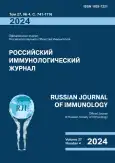Особенности провоспалительного ответа моноцитов/макрофагов у больных метаболическим синдромом на примере продукции IL-6 и MCP-1
- Авторы: Малащенко В.В.1, Хазиахматова О.Г.1, Юрова К.А.1, Тодосенко Н.М.1, Бограя М.М.1, Газатова Н.Д.1, Мелащенко О.Б.1, Белецкая М.А.1, Литвинова Л.С.1
-
Учреждения:
- ФГАОУ ВО «Балтийский федеральный университет имени Иммануила Канта»
- Выпуск: Том 27, № 4 (2024)
- Страницы: 877-882
- Раздел: КРАТКИЕ СООБЩЕНИЯ
- URL: https://journal-vniispk.ru/1028-7221/article/view/267868
- DOI: https://doi.org/10.46235/1028-7221-16912-COT
- ID: 267868
Цитировать
Полный текст
Аннотация
Метаболический синдром (МС) является одним из наиболее распространенных социально значимых заболеваний. Около 1,9 миллиарда человек страдают от этого заболевания, что приводит к колоссальной нагрузке на систему здравоохранения во всем мире. Особенно это выражается в контексте сопутствующих заболеваний. Так, при МС значительно повышаются риски развития сахарного диабета 2-го типа, сердечно сосудистых заболеваний, печеночной дисфункции, почечной недостаточности, ретинопатии и др. На фоне прогрессирования МС в организме происходят нарушения в работе иммунной системы, в том числе ассоциированные с митохондриальной дисфункцией, приводящие к формированию хронического воспаления. В частности, увеличивается количество циркулирующих моноцитов, которые активно рекрутируются в воспаленную жировую ткань, где происходит неспецифическая провоспалительная активации клеток врожденного иммунитета, которые приобретают М1-подобный фенотип и становятся менее чувствительными к противовоспалительным стимулам. Это в итоге приводит к снижению функциональной активности моноцит/макрофагов и их иммунной пластичности.
Объектом исследования являлась венозная кровь пациентов, а также полученные из нее методом иммуномагнитной сепарации CD14+ моноцит/макрофаги. В работе мы сосредоточились на поиске значимых взаимосвязей между маркерами хронического воспаления и формированием иммунной толерантности моноцитов/макрофагов у больных метаболическим синдромом. Была проведена оценка биохимических показателей, базальной и ЛПС-стимулированной продукции провоспалительных цитокинов (IL-6 и MCP-1) культурой моноцит/макрофагов у пациентов с метаболическим синдромом.
Оценка биохимических показателей в образцах крови пациентов с МС и у здоровых доноров позволила выявить, что уровни АЛАТ, АСАТ, ГГТ, щелочной фосфатазы, мочевой кислоты, С-реактивного белка, глюкозы и инсулина у пациентов с МС были значимо выше, чем у здоровых доноров. Уровни П-амилазы и липопротеинов высокой плотности были значимо ниже, чем в контрольной группе.
В рамках экспериментальной модели выявлено снижение продукции цитокинов в ответ на ЛПС при повторной стимуляции относительно первичной на 7-е сутки. Также было выявлено, что ответ на первичный стимул был выше у клеток полученных от пациентов с индексом массы тела (ИМТ) > 40 кг/м2, что может косвенно указывать на наличие фенотипа ассоциированного с хроническим воспалением и как следствие сниженную пластичность моноцит/макрофагального иммунного ответа.
Ключевые слова
Полный текст
Открыть статью на сайте журналаОб авторах
В. В. Малащенко
ФГАОУ ВО «Балтийский федеральный университет имени Иммануила Канта»
Email: larisalitvinova@yandex.ru
канд. биол. наук, науч. сотр., Центра иммунологии и клеточных биотехнологий ОНК «Институт медицины и наук о жизни»
Россия, г. КалининградО. Г. Хазиахматова
ФГАОУ ВО «Балтийский федеральный университет имени Иммануила Канта»
Email: larisalitvinova@yandex.ru
к.б.н., старший научный сотрудник Центра иммунологии и клеточных биотехнологий ОНК «Институт медицины и наук о жизни»
Россия, г. КалининградК. А. Юрова
ФГАОУ ВО «Балтийский федеральный университет имени Иммануила Канта»
Email: larisalitvinova@yandex.ru
к.м.н., старший научный сотрудник Центра иммунологии и клеточных биотехнологий ОНК «Институт медицины и наук о жизни»
Россия, г. КалининградН. М. Тодосенко
ФГАОУ ВО «Балтийский федеральный университет имени Иммануила Канта»
Email: larisalitvinova@yandex.ru
к.б.н., старший научный сотрудник Центра иммунологии и клеточных биотехнологий ОНК «Институт медицины и наук о жизни»
Россия, г. КалининградМ. М. Бограя
ФГАОУ ВО «Балтийский федеральный университет имени Иммануила Канта»
Email: larisalitvinova@yandex.ru
младший научный сотрудник Центра иммунологии и клеточных биотехнологий ОНК «Институт медицины и наук о жизни»
Россия, г. КалининградН. Д. Газатова
ФГАОУ ВО «Балтийский федеральный университет имени Иммануила Канта»
Email: larisalitvinova@yandex.ru
О. Б. Мелащенко
ФГАОУ ВО «Балтийский федеральный университет имени Иммануила Канта»
Email: larisalitvinova@yandex.ru
научный сотрудник Центра иммунологии и клеточных биотехнологий ОНК «Институт медицины и наук о жизни»
Россия, г. КалининградМ. А. Белецкая
ФГАОУ ВО «Балтийский федеральный университет имени Иммануила Канта»
Email: larisalitvinova@yandex.ru
аспирант ОНК «Институт медицины и наук о жизни»
Россия, г. КалининградЛ. С. Литвинова
ФГАОУ ВО «Балтийский федеральный университет имени Иммануила Канта»
Автор, ответственный за переписку.
Email: larisalitvinova@yandex.ru
д.м.н., директор Центра иммунологии и клеточных биотехнологий ОНК «Институт медицины и наук о жизни»
Россия, г. КалининградСписок литературы
- Chew N.W.S., Ng C.H., Tan D.J.H., Kong G., Lin C., Chin Y.H., Lim W.H., Huang D.Q., Quek J., Fu C.E., Xiao J., Syn N., Foo R., Khoo C.M., Wang J.W., Dimitriadis G.K., Young D.Y., Siddiqui M.S., Lam C.S.P., Wang Y., Figtree G.A., Chan M.Y., Cummings D.E., Noureddin M., Wong V.W., Ma R.C.W., Mantzoros C.S., Sanyal A., Muthiah M.D. The global burden of metabolic disease: Data from 2000 to 2019. Cell Metab., 2023, Vol. 35, no. 3, pp. 414-428.e3.
- Forrester J.V., Kuffova L., Delibegovic M. The role of inflammation in diabetic retinopathy. Front. Immunol., 2020, Vol. 11, 583687. doi: 10.3389/fimmu.2020.583687.
- Lumeng C.N., Saltiel A.R. Inflammatory links between obesity and metabolic disease. J. Clin. Invest., 2011, Vol. 121, no. 6, pp. 2111-2117.
- Powell-Wiley T.M., Poirier P., Burke L.E., Després J.P., Gordon-Larsen P., Lavie C.J., Lear S.A., Ndumele C.E., Neeland I.J., Sanders P., St-Onge M.P., American heart association council on lifestyle and cardiometabolic health, council on cardiovascular and stroke nursing, council on clinical cardiology, council on epidemiology and prevention, stroke council. Obesity and cardiovascular disease: a scientific statement from the american heart association. Circulation, 2021, Vol. 143, pp. e984-e1010.
- Todosenko N., Khaziakhmatova O., Malashchenko V., Yurova K., Bograya M., Beletskaya M., Vulf M., Gazatova N., Litvinova L. Mitochondrial dysfunction associated with mtDNA in metabolic syndrome and obesity. Int. J. Mol. Sci., 2023, Vol. 24, no. 15, 12012. doi: 10.3390/ijms241512012.
- Todosenko N., Khaziakhmatova O., Malashchenko V., Yurova K., Bograya M., Beletskaya M., Vulf M., Mikhailova L., Minchenko A., Soroko I., Khlusov I., Litvinova L. Adipocyte- and Monocyte-Mediated Vicious Circle of Inflammation and Obesity (Review of Cellular and Molecular Mechanisms). Int. J. Mol. Sci., 2023, Vol. 24, no. 15, 12259. doi: 10.3390/ijms241512259.
Дополнительные файлы







